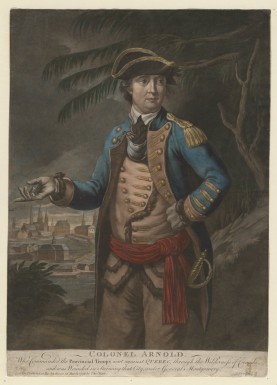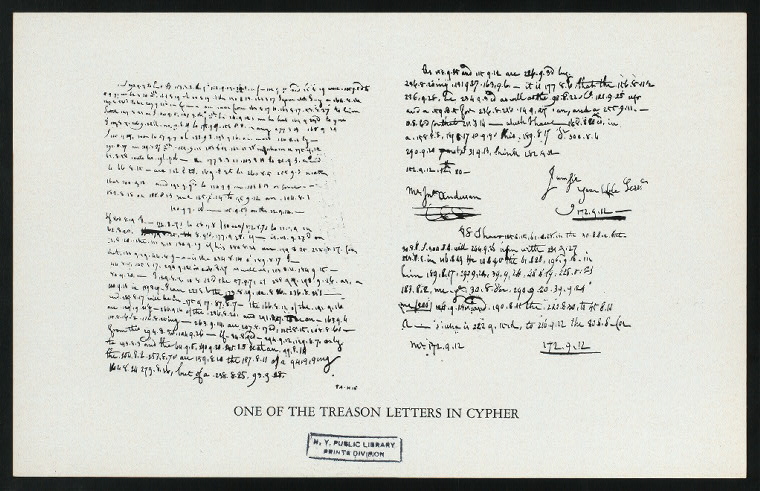
Benedict Arnold fought in the American Revolutionary War for the Americans, until joining the British. He is known best as a traitor to America, and still holds this infamous reputation today.
In Norwich, Connecticut on January 14, 1741, Hannah Waterman King, or Hannah Arnold, gave birth to Benedict Arnold with her husband, Benedict Arnold. Named for his older brother who died of yellow fever in 1739, Benedict was the second of six children. He came from a long line of men named Benedict Arnold. Of his five siblings, only his sister, Hannah, lived to adulthood. The other four died young from a yellow fever outbreak.
Arnold’s parents and family members all expected him to attend and graduate Yale after he finished his education at a private school he was enrolled in at ten years old. His father, a wealthy merchant and businessman, however, began drinking more and more regularly after most of his children had passed. The family began to lose their money because of his drinking problem. So, Arnold was taken out of school at fourteen. Luckily, because of his mother, Arnold was able to find an apprenticeship with Daniel and Joshua Lathrop, two brothers who owned and operated an apothecary located in Norwich. For seven years to come, Arnold would stay with the brothers as an apprentice.
At fourteen, Arnold also tried to join the provincial militia. He wanted to help the French fight against the Indians in the raging war. His mother would not allow it. Two years later in 1757, Arnold was able to join the Connecticut militia. Thirteen days later, he deserted. His mother was dying and the two had always been very close. In 1759, she died. Meanwhile, his father was drinking more than ever. This led to being arrested many different times because of being drunk in public. He died a few years later in 1761.
The following year after his father’s death, Arnold made his way up to New Haven, Connecticut where he worked as a book seller and pharmacist. Without the Lathrop brothers he had apprenticed with, this would have been impossible. They proved to be very helpful for Arnold while he was still quite young. When his father had been in debt, he sold the family’s household. In 1763 the Lathrops lent Arnold enough money to repurchase his old home. Arnold was then able to sell it for a reasonable amount of money.
Adam Babcock was another merchant in New Haven. He was young like Arnold, too. Arnold and Babcock formed a quick friendship and partnership in 1764. The pair purchased three trading ships. From there, they were able to make a lot of money by trading in the West Indies. Hannah, Arnold’s younger sister and only remaining immediate family member, came to New Haven to help her brother at his apothecary by managing. Arnold traveled frequently with his new trade business.
After the Sugar Act of 1764 Stamp Act of 1765 were passed by British Parliament, Arnold joined a secret organization called the Sons of Liberty. Like many others, his business was affected by these new laws. He fought hard to have them taken back. Eventually, Arnold began smuggling, leading him to having a high debt of about £16,000, or $21,196 USD. In 1767, he was convicted for disorderly conduct charged and fined for beating up a man in public he suspected was going to tell authorities about his smuggling.
Not even a month later, Arnold married Margaret Mansfield on February 22, 1767. Margaret was the daughter of New Haven’s sheriff, Samuel Mansfield. A year after their marriage, Margaret gave birth to a baby boy they named Benedict. In 1769 their second son, Richard was born, followed by Henry in 1772. However, Margaret died June 19, 1775, shortly after the American Revolutionary War had begun. Hannah had been managing the household while Margaret was still alive, and continued to do so after her death.

Not long before Margaret’s death in June, Arnold had been elected to the position of a captain in Connecticut’s Militia in March. Arnold left New Haven for Lexington and Concord. He came up with the idea of seizing Fort Ticonderoga, located in New York. The fort was not defended well with not nearly enough British troops protecting its borders. Because of his proposal, Arnold was given the rank of a colonel. In June they arrived at Fort Ticonderoga after raiding Fort Saint-Jean in Quebec. After getting into an argument with the commander, Arnold resigned and left for home. His wife had recently passed while he was at Ticonderoga and he didn’t find out until after his resignation.
Arnold later set off for Cambridge, Massachusetts. There, he met with George Washington, proposing they attack Quebec City by going through what is now Maine. The Continental Army issued him with the command of a colonel. Arnold, with 1,100 men joining him, left for Quebec in September 1775. About 500 men did not make the full journey, 200 died and 300 went back home. It was a long way from Massachusetts to Quebec, especially when traveling on horse or foot. Richard Montgomery joined Arnold and his men. Then, on December 31, they attacked Quebec City. Arnold’s leg was injured badly, leaving it shattered, though he was able to live, unlike Montgomery and many of the men. Because he led the assault on Quebec City, he was promoted to the rank of a brigadier general. The rank did not last a year, as he was replaced by Major General David Wooster the following April.
While in Montreal, Arnold served as a military commander. In May the British had arrived in Montreal, forcing Arnold to leave. This time, Arnold made his way to Lake Champlain. In October of 1776, the Navy fought against the British at the Battle of Valcour Island. The British clearly won, most of the American ships were badly damaged or had already sunk.
After the British had seized Newport in December of 1776, Arnold was assigned to the poorly equipped and defended Rhode Island. Arnold spent most of his time in New Haven with his children or in Boston. He even courted Betsy Deblois for some time, but their courtship did not work out.
When Congress refused to give Arnold the rank of a major general in February of 1777, Arnold left for Philadelphia. However, the British were heading towards Danbury, Connecticut at the same time. Americans had a great deal of supplies located in Danbury. Arnold was able to quickly organize a group of men to fight the British. David Wooster and General Gold S. Silliman of the Connecticut militia helped Arnold with this. Arnold and his men fought the British in Connecticut in the Battle of Ridgefield. For the second time, Arnold badly wounded his left leg. He was finally promoted to major general after attempting to for months. He was still not happy though, and sent a letter of resignation in July. Washington would not allow it though. Instead, Arnold was ordered to go north.
On July 24, Arnold had successfully arrived at Fort Edward, New York with Philip Schuyler in charge. He was sent to Fort Stanwix with 900 men on August 13. The British got word that the American forces sent to relieve Fort Stanwix were much larger than expected. The British Brigadier General Barry St. Leger and his men were abandoned by the Indians. The British gave up.
Afterwards, Arnold went back to Hudson and tried to fight in the Battles of Saratoga. General Gates wouldn’t allow him to fight after the first battle. The two got into a heated fight, which led to Arnold joining the second battle despite being ordered not to. For the third time, he wounded his left leg. Congress gave him command seniority unlike before after his attempts in the Battles of Saratoga. Arnold was angry though, thinking congress only did this out of sympathy for his constant injuries.
Arnold refused to have his leg amputated and it was instead set and left two inches shorter than his right leg. In May of 1778, he joined the army once more after spending some time in recovery. Along with many American soldiers, Arnold took part in the Oath of Allegiance. By taking this oath, he was pledging his allegiance to the United States and nowhere else. Next, he was appointed by Washington as the military commander of Philadelphia the next month.

While in Philadelphia, Arnold met and courted the young Margaret “Peggy” Shippen. Peggy was only eighteen, Arnold was twenty-years her senior. She came from a family of loyalists. On April 8, 1779, the two were married. Peggy would later give birth to seven children, Edward Shippen Arnold (March 1780-December 1813), James Robertson Arnold (August 1781-December 1854), Sophia Matilda Arnold (July 1785-June 1828), George Arnold (September 1787-November 1828), and William Fitch Arnold (June 1794-November 1846) Two of their children did not survive to adulthood. All four of their sons would later join the British army.
Many working with Arnold noticed he was unhappy with his position in the army in 1778. It became more and more obvious as the war continued. Joseph Stansbury and Arnold met in early May of 1779. From there, Stansbury would meet Major André, a British spy, and introduce him to Arnold. With help from Peggy, Arnold and André corresponded often. From there, Arnold would only continue to help British spies. Arnold sent André letters with instructions on how they could later communicate. Peggy was able to have these letters passed onto her husband through a women’s circle she had joined.
Arnold, by July of 1779, gave the British information on where troops were located and supplies were stored among other things. In October many patriot families were threatening Loyalists families. Arnold and Peggy were especially threatened because of Peggy’s Loyalist family. Before this, Arnold had been trying to negotiate with the Continental Congress on his pay for helping out with the military.
Charges against Arnold were to be heard by court martial in June of 1779 originally. It was later delayed to December though. Many people thought poorly of Arnold, especially for actions and things he had done in the beginning of the war. By the end of January, however, he was cleared of all charges with the exception for two minor ones. Not long after, Congress said that Arnold owed them about £1,000 because he did not document the events that had taken place in Quebec. At the end of April, Arnold resigned from the American military out of anger.

When Philip Schuyler suggested Arnold taking command at West Point, Arnold began corresponding with the British once again. He wrote to them about Schuyler’s suggestions and plans for West Point. In June, Arnold was in West Point to inspect the area. Afterwards, he wrote to the British once more, this time talking about the conditions and the soldiers at West Point. When he returned to Philadelphia, he then told the British that he may even be able to provide them with a map of West Point in hopes they could successfully attack the Americans. General Clinton and André were excited about this new information, but forgot to write back. Arnold was angry and sent a series of letters expressing his distrust for the British because they would not respond.
Arnold took command of West Point in August of 1780. General Clinton offered to give him £20,000 for the information on West Point. Arnold accepted, though it took awhile for the letters to reach them. This was because Peggy had to deliver the letters to Arnold and it was a hassle getting them through going unnoticed. Arnold worked hard while at West Point to be sure that the British would be victorious with the siege. However, a letter from Arnold to Clinton was given to the Connecticut militia by William Heron. Nothing was thought of it though because it appeared to be a business letter.
On September 21, Arnold and André met to discuss the final plans for the siege on West Point. Two days later, André was captured after his boat was damaged and he had to return on foot. The men found the letters and papers from Arnold and had them sent to Washington. When Washington received the papers, he realized what Arnold had been doing. Arnold wrote to Washington and was able to secure safe passage to Peggy and his family who were still in Philadelphia. André was eventually hanged though Arnold got out.
From there, Arnold joined the British army. Washington sent out orders to his men to hang Arnold if he was found. Arnold commanded a group of men from May 12, 1781 to May 20 when William Phillips died. He would continue to serve with the British for a few more years. Then, in 1785 he moved with his son Richard to Saint John, New Brunswick. Him and Richard established business and trade while there. In 1786, Arnold headed to london to bring his family to his new home in Saint John. They returned to London in December of 1791 though.
Arnold and the Earl of Lauderdale fought in a duel in July of 1792, though no one was shot. Arnold was then sent to prison by the French because he had been accused of spying for the British. Arnold continued to help the British military in hopes he would be given a higher rank, but he was not. His family was awarded with land though in upper Canada.
In January of 1801, Arnold began feeling ill more and more often. His health was only getting worse. Since 1775 he had even been suffering through gout. His right leg was ruined by his gout condition and he was diagnosed with dropsy. On June 14, 1801 he died after four long days of delirium. He was sixty years old.